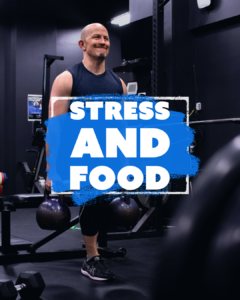Stress & Food

Stress is both an appetite killer and booster:
- When we are facing immediate, acute stress, our bodies release epinephrine (adrenaline) to prepare for fight or flight. Hunger and digestion are moved down the list of priorities as blood flow is prioritized away from our digestive tracts to muscle tissue, and appetite is suppressed.
- With longer periods of chronic stress, however, appetites are increased. This is in part due to the release of another stress hormone, cortisol, which regulates your body’s stress response and can increase cravings for foods high in fat and/or sugar. In addition to this, we are also taught from birth that food is comfort—when you cried, you got a bottle and felt better. While coping with food is often vilified, it is a natural, normal response.
So how can we support our nutritional needs when stressed? Firstly, attempt to get to the source of the problem by addressing your stressors and diminishing them. What is the root cause of your stress? What problems are within your sphere of control to address and which things are not and can be dismissed? What do you need to cope and truly feel better? Is it exercise, meditation, social support, asking for help, something else?
Secondly, what we put in or don’t put in our bodies is also going to affect our stress. Whether you’re too stressed to eat or you’re overeating, you can try these tips:
- Practice self-compassion by reassuring yourself this period is temporary and you’re doing the best you can. You don’t need more stress by worrying about all the food you’re eating/not eating.
- If you’re not hungry, try to still stick to your regular eating schedule (or even switch to smaller, more frequent meals) and attempt to eat something in a calm space. While whole foods will be more nourishing and energizing, eat whatever is appetizing; some food is better than no food at all. Smoothies, juice, soup, and milk are also great options if you’re feeling too nauseous to eat, and soft, bland foods like rice, lean meats, legumes, tofu, and spinach may be gentler on an upset stomach.
- If you’re overeating when stressed, what can you do to distract before reaching for food? This could include things like going for a walk, stretching, doing mobility work, colouring, painting, journaling, knitting; preferably something more active than passive like watching TV (and thinking about how nice it would be to eat a bag of chips while doing it). If you decide to seek comfort through food, ensure it is a conscious decision and give yourself unconditional permission to eat without guilt afterwards. Lastly, ensure you’re still eating a minimum of three balanced meals to remain nourished and satiated.
- Finally, dial in the basics: get 7-9 hours of sleep, drink plenty of water, prioritize a variety of nutrient dense foods, and participate in gentle, joyful movement.